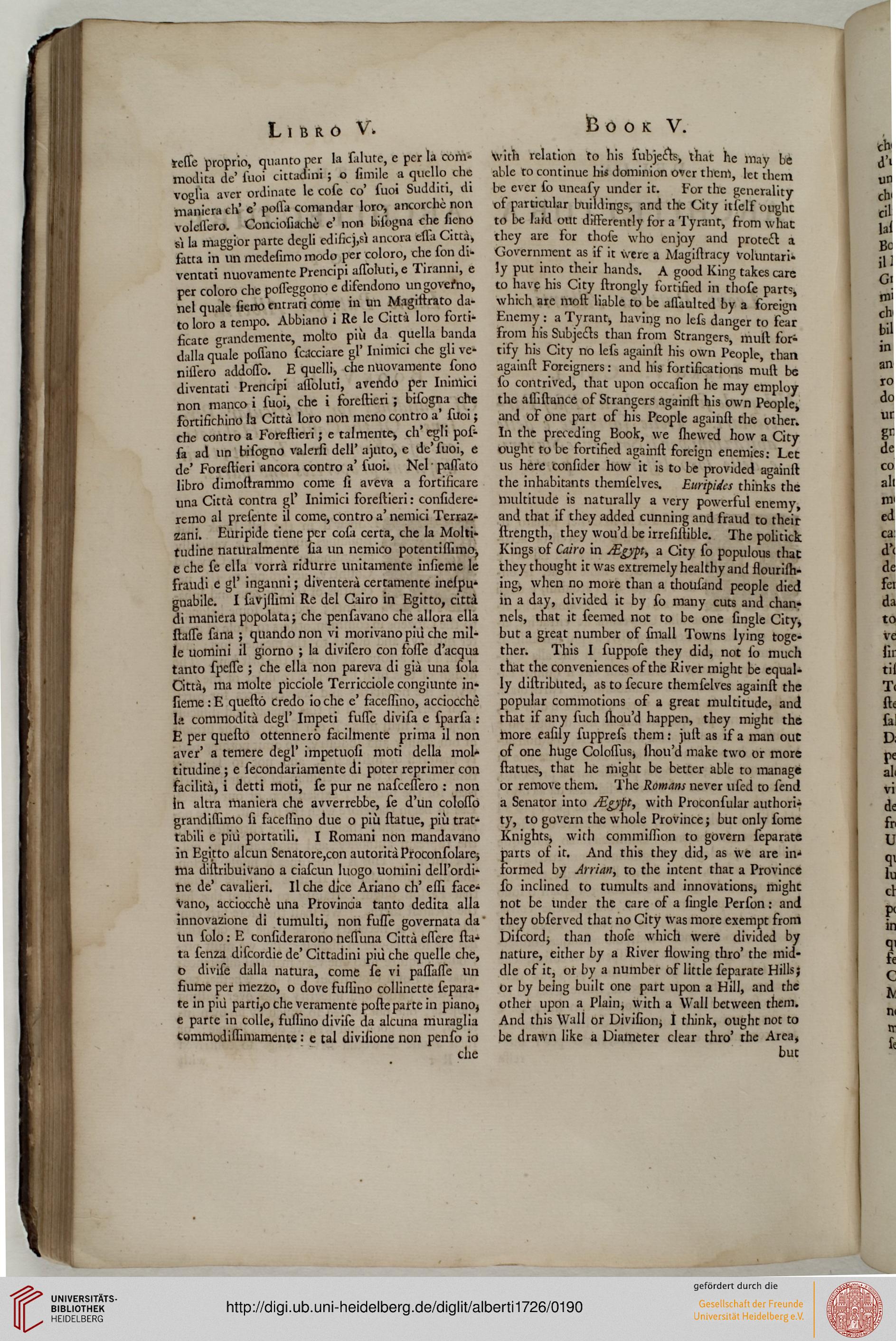Libro V.
SelTc proprio, quanto per la sallite, e per la com-
tnodita de' suoi cittadini ; o simile a quello che
voglia aver ordinate le cose co' suoi Sudditi, di
maniera eh' e' polla comandar loro, ancorché non
volcll'ero. Conciosiaché e' non biiògna che sieno
sì la maggior parte degli cdisicj,sì ancora ella Città,
fatta in Un medesimo modo per coloro, che son di-
ventati nuovamente Prencipi assolliti, e Tiranni, e
per coloro che posseggono e difendono un governo,
nel quale sieno entrari come in un Magittrato da-
to loro a tempo. Abbiano i Re le Città loro forti-
ficate grandemente, molto più da quella banda
dalla quale pollano tacciare gì' Inimici che gli ve-
nnero addosso. E quelli, che nuovamente sono
diventati Prencipi assolliti, avendo per Inimici
non manco i suoi, che i forestieri ; bisogna che
fortifichino la Città loro non meno contro a' suoi ;
che contro a Forcstieri ; e talmente, ch'egli pos-
sa ad un bisogno valerli dell' ajtito, e de'suoi, e
de' Foreslieri ancora contro a' suoi. Nel ' passato
libro dimoltrammo come si aveva a fortificare
una Città contra gì' Inimici foreslieri : considere-
mmo al prelente il come, contro a' nemici Terraz-
zani. Euripide tiene per cosa certa, che la Molti-
tudine naturalmente sia un nemico potentilsimOj
e che sé ella vorrà ridurre unitamente insieme le
fraudi e gì' inganni ; diventerà certamente inespu*
girabile. I savjMìmi Re del Cairo in Egitto, città
di maniera popolata; che pensavano che allora ella
stasie sana ; quando non vi morivano più che mil-
le uomini il giorno ; la divisero con fosTe d'acqua
tanto spelse ; che ella non pareva di già una sola
Città, ma molte picciole Terricciole congiunte in-
sieme: E quello credo io che e' facesfino, acciocché
la commodità dcgl' Impeti fulse divisa e sparsa :
E per quello ottennero facilmente prima il non
aver' a temere degl' impetuosi moti della mol-
titudine ; e secondariamente di poter reprimer con
facilità, i detti moti, sé pur ne nasceil'ero : non
In altra maniera che avverrebbe, sé d'un colono
grandillimo si facelsmo due o più statue, più trat-
tabili e più portatili. I Romani non mandavano
in Egitto alcun Senatore,con autorità Proconsolare;
Ira distribuivano a ciaseun luogo uomini dell'ordi-
ne de' cavalieri. Il che dice Ariano eh' elsi face-
Vano, acciocché una Provincia tanto dedita alla
innovazione di tumulti, non fusse governata da '
un solo : E considerarono nelsuna Città edere sta^
ta senza diseordie de'Cittadini più che quelle che,
o divise dalla natura, come sé vi palTasTe un
fiume per mezzo, o dove fusiino collinette separa-
te in più parti,o che veramente posle parte in pianot
e parte in colle, fusiino divise da alcuna muraglia
commodilTìniamente : e tal divilione non penso io
die
k O O K V.
With relation to his subjecìs, that he may be
able to continue his dominion over them, let them
be ever so uneasy under it. For the generality
of particular buildings, and the City itlelf ought
to be laid out disferently for a Tyrant, from what
they are for those who enjoy and protect a
Government as if it Were a Magillracy Voluntari-
ly put into their hands. A good King takes care
to have his City strongly sortified in those parts,
which are molt liable to be aisaulted by a soreign
Enemy : a Tyrant, having no Iess danger to fear
from his Subjefts than from Strangers, mull for^
tify his City no less againll his own People, than
againsl Foreigners : and his fortifications mull be
so contrived, that upon occasion he may employ
the assistance of Strangers againsl his own People,
and of one part of his People againll the other.
In the preceding Book, we (hewed how a City
ought to be fortified againfl: foreign enemies: Let
us here consider how it is to be provided againll
the inhabitants themselves. Euripides thinks the
multitude is naturally a very powerful enemy,
and that if they added cunning and fraud to their
strength, they wou'd be irresislible. The politick
Kings of Cairo in JEgypt, a City so populous that
they thought it was extremely healthy and ssourilh-
ing, when no more than a thousand people died
in a day, divided it by so many cuts and chan-
nels, that it seemed not to be one single City,
but a great number of sinali Towns lying toge-
ther. This I suppose they did, not so much
that the conveniences of the River might be equal-
ly distributed, as to secure themselves againsl the
popular commotions of a great multitude, and
that if any such Ihou'd happen, they might the
more easily supprels them: jull as if a man out
of one huge CololTus, Ihou'd make two or more
flatues, that he might be better able to manage
or remove them. The Romans never used to send
a Senator into JEg)st, with Proconsular authori-
ty, to govern the whole Province; but only some
Knights, with commisiion to govern separate
parts of it. And this they did, as we are in'
formed by Arr'nw, to the intent that a Province
so inclined to tumults and innovations, might
not be under the care of a single Person : and
they observed that no City was more exempt from
Discord; than those which were divided by
nature, either by a River flowing thro' the mid-
dle of it, or by a number of little separate Hillsj
or by being built one part upon a Hill, and the
othet upon a Plain, with a Wall between them.
And this Wall or Division; I think, ought not to
be drawn like a Diameter clear thro' the Area,
but





